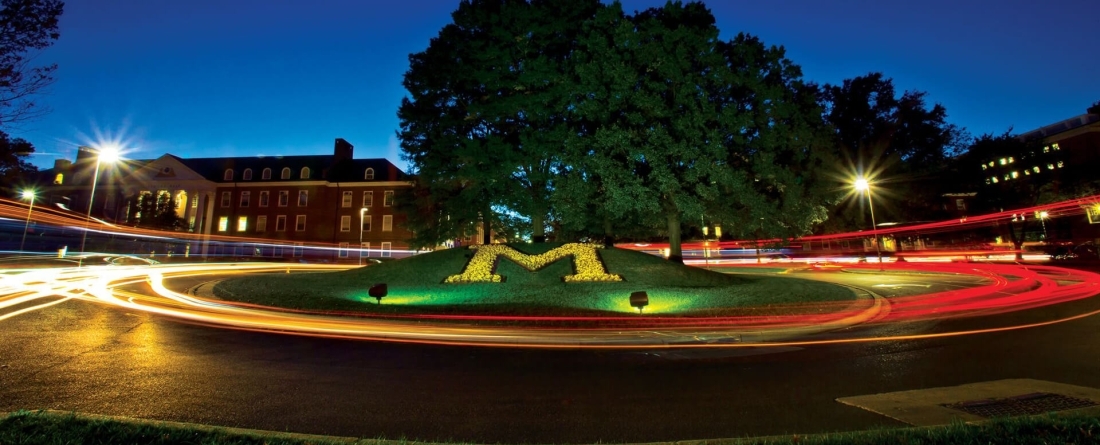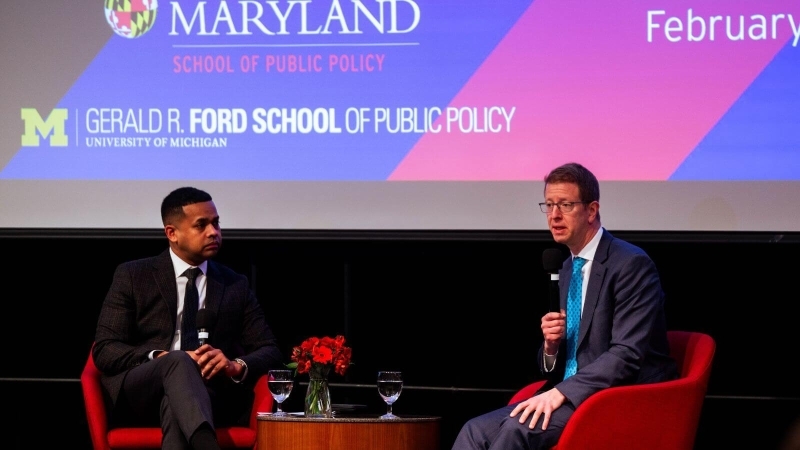
A BIG10 Response to Challenges to American Democracy
Public opinion polls reveal increasing skepticism about the functioning of two institutions fundamental to the ongoing experiment of the United States: higher education and democracy itself. In light of this skepticism, institutions of higher education stand at an inflection point. Great legacy universities have been challenged recently to justify their existence and define their place in our larger democratic culture. Yet bridging the gap between polarized citizens and uplifting local communities is not political and it is not partisan; it is a calling for all in higher education, and the universities serving the broad cross section of America in the BIG Ten are uniquely equipped to answer this call.
The BIG Ten Collaboration: Democracy in the 21st Century, founded in 2021 by the School of Public Policy at the University of Maryland and the Ford School at the University of Michigan, reaches across the nation to help coordinate and boost joint efforts to bolster the health and future of our democracy.
In early 2025, the School of Public Policy, with the support of the Ford School, hosted the Inaugural BIG Ten Democracy Summit to bring together representatives from across the entire BIG Ten to College Park and chart a course forward for the Collaboration in these troubled times. The Summit was a resounding success, highlighting the BIG Ten’s exceptional ability to promote positive research and action across geographically and politically diverse states that stretch from coast to coast.
Whether it be through policy simulations or future summits, the BIG Ten Collaboration will continue its diverse efforts to bolster democracy in our home states across the country through non-partisan research, student trainings, and community engagement.
- Kilmer/Monteiro: In the opening discussion, Derek Kilmer (U.S. Program and Policy, Rockefeller Foundation and former U.S. Representative) and Paul Monteiro (Secretary, Department of Service and Civic Innovation, State of Maryland) opened the summit with an in-depth discussion of the state of the nation’s civic health. Touching on Rep. Kilmer’s experience in Congress and past collaborations with the University of Washington to build bridges between divided communities, the pair considered ways that philanthropy can best serve in its unique role in the fight to bolster our democracy.
- McQuade/Lorente: Touching on topics ranging from journalism to misinformation, Barbara McQuade (Former US Attorney for the Eastern District of Michigan, Professor from Practice, University of Michigan School of Law) and Dean Rafael Lorente (Dean, Professor of Practice, Philip Merrill School of Journalism, University of Maryland) covered the many ways the media and information landscape has shifted in recent years. Considering the ways this has shaken our democratic norms and systems, they discussed ways law schools and journalism schools can fight back against mis and disinformation and amplify objective truths that our systems rely on.
- Broadening the Lens: Students as Agents of Civic Change
Low turnout on college campuses often becomes a clarion call to engage more students in the voting process itself, as a greater voting yield provides a tangible metric for “success.” Yet, the voting rate indicates a broader disconnect between students and civic engagement in general. What, precisely, does student participation in civic engagement, beyond the act of voting, look like? This session explores obstacles to students’ civic engagement and models developed by Big Ten institutions to encourage greater civic engagement.
- Introduction by Jennifer Domagal-Goldman, Executive Director, All In Democracy Challenge
- Moderator Ebonie Johnson Cooper, Associate Clinical Professor, Faculty Director, Nonprofit Executive Education and Training, The Do Good Institute, School of Public Policy, University of Maryland
- Madelyn Hindman, Graduate Student, Penn State University
- Gavin Neubauer, Founder, Prince George’s Vote, Student, University of Maryland
- Hillary Poudeu Tchokothe and Maurielle Courtois, Co-Presidents, U-M - Turn up Turnout, University of Michigan
- Jessica Ronan-Frisch, Associate Director, Center for Youth Political Participation, Eagleton Institute of Politics, Rutgers, The State University of New Jersey
2. Big Ten Universities as Laboratories of Innovation for Democratic Engagement
Big Ten universities are employing a variety of innovative practices to foster civic engagement beyond voting in their student bodies, including curricular and co-curricular practices, research, and service learning. This panel will share models from universities leading these efforts, discuss their successes and challenges, and explore broader collaboration within the conference to increase impact.
- Moderator Stuart Shapiro, Professor, Dean, Edward J. Bloustein School of Planning and Public Policy
- Jodi Benenson, Associate Professor of Public Administration, School of Public Administration, University of Nebraska Omaha
- Ronit Eisenbach, Professor, School of Architecture, Planning & Preservation, University of Maryland
- Amy Lee, Associate Director, Institute for Democratic Engagement & Accountability, College of Arts and Sciences, the Ohio State University
- Elizabeth Matto, Research Professor, Director, Eagleton Institute of Politics, Rutgers, The State University of New Jersey
- Eleonora Redaelli , Professor, School of Planning, Public Policy and Management, University of Oregon
3. Practicing in the Community: Partnerships with State and Local Governments
As primarily public institutions and “state schools,” Big Ten universities are uniquely positioned to foster close relationships with local and state governments and communities. These relationships also offer a pathway to demonstrate the value and contributions of higher education to a broader public. What models for state and local partnership exist within the Big Ten?
- Moderator Kate Burns, Executive Director, MetroLab Network
- Paul Helmke, Director, Civic Leaders Center, Professor of Practice, Paul H. O'Neill School of Public and Environmental Affairs, Indiana University
- Travis Kraus, Associate Professor of Practice and Director, Iowa Initiative for Sustainable Communities, College of Planning and Public Affairs, University of Iowa
- Steve Mokrohisky, County Administrator, Lane County, Oregon
- Mindy Romero, Founder and Director, Center for Inclusive Democracy, Associate Professor, Price School of Public Policy, University of Southern California
4. Higher Education’s Role in Safeguarding Democracy: Election Systems and Enabling Election Service
As technology continues to advance, concerns about election security and election fraud continue to rise in contemporary U.S. and international political discourse. This panel will discuss shared expertise from Big Ten institutions that strengthen election systems and administration, modeling the efficacy of partnerships with policymakers and agencies at the state and federal level to address threats to a fundamental tenet of democracy: free and fair elections.
- Introduction by John Ronquillo, Director of the Institute for Public Leadership, Associate Professor, School of Public Policy, University of Maryland
- Moderator Ben Hovland, Chair, United States Elections Assistance Commission
- Cody Buntain, Assistant Professor; Affiliate Fellow, UMD Honors College – Artificial Intelligence Cluster, College of Information, University of Maryland
- Ryan Allen, Associate Dean for Research, Hubert H. Humphrey School of Public Affairs, University of Minnesota
- James Long, Professor, Associate Chair, Department of Political Science, University of Washington
Elizabeth Matto (Research Professor, Director, Eagleton Institute of Politics, Rutgers, The State University of New Jersey), Dean Robert Orr (Professor and Dean, School of Public Policy, University of Maryland, College Park), and Dean Celeste Watkins-Hayes (Joan and Sanford Weill Dean of Public Policy, Gerald R. Ford School of Public Policy, University of Michigan) led the summit’s closing plenary in a discussion of the various takeaways from the day's keynotes and panels. Taking questions and reporting out from the day’s panels, these leaders mapped out ways the Collaboration could harness the momentum of the summit to deepen and build out its efforts in coming years.
Takeaways from the summit include both common challenges that institutions across the BIG Ten are facing and shared benefits that can arise from working across campuses:
Identified Challenges
- Students need transformational civic learning beyond registering and voting
- Students (as well as university communities writ large) need much deeper civic learning and engagement experiences
- Attacks on higher education
- Institutional siloing – loss of opportunities to share practices and research with potential efficacy for broader conference institutions
- Lack of bandwidth for committee members and need for funding/infrastructure with dedicated staff and website to move Big Ten Collaboration forward
The Benefits of Collaboration: Collective Power to Support the Core Functions of Institutions of Higher Education
- Student-focused collaboration and bridge-building
- Shared programming that leverages institutions’ individual expertise, including establishing collaborative classes and a set of new offerings in democracy/civic engagement space across all of the BIG Ten schools.
- Research collaborations
- Shared scholarship to address public policy challenges that span geographic and demographic boundaries is needed now more than ever. Collaborative scholarship opportunities for students, promotion of new and existing democracy programs, and scholarship network-wide and joint efforts with those outside the BIG Ten interested in impactful activities will amplify the potential impact of existing research efforts at our schools.
- Public Good
- Civic learning is professional learning for our students. The Collaboration will lead programming with elected officials on bi-partisan basis to build channels to streamline the work of modernizing our democracy, development of a Conference wide-toolbox of best practices rooted in scholarship that exists, all to harness the power of collective in this moment of attack on higher education and plug our students into real efforts that will equip them to continue these efforts after graduation.
- Shoring the foundations of democracy
- The BIG Ten is well-positioned to respond to the immediate need to address the current state of our democracy. Our institutions can serve as laboratories to offer paths for re-imagining the future and expansiveness of democracy in the United States
Our self-governed democracy needs new ideas and fresh perspectives. When Big Ten students and scholars gather to discuss critical issues across vast geographic boundaries and from diverse backgrounds, we will all benefit from the knowledge they generate.Robert C. Orr Dean, School of Public Policy at the University of Maryland

